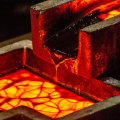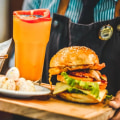Foodies are taking over the world. Whether he opts for the gourmet creations of the best chefs or for the latest and crazy culinary mix, eating is his passion and he takes it seriously. And while you finish another wonderful meal, you realize that I would like to be paid to do this. You can, and a lot of people do.
Food critics aren't the only ones getting paid to eat, though that's a classic career for food lovers. There are a lot of jobs for people who love to eat and appreciate food, some that you probably haven't even thought about. These 10 should go to the front line in your culinary career consideration. First course? Professional food tasters are paid, as you can imagine, to sample food all day long. Tasters usually work for a specific company and help develop new products by testing variations in ingredients, textures and flavors.
Many professional tasters have degrees in nutrition. Flavor is only a small part of creating a food product; obviously, ingredients also matter. Stand in the middle of your supermarket and take a look around you. Almost every grocery item is the work of a food scientist. Most foods, processed and unprocessed, need specialized food scientists to ensure that they arrive at the table healthy and unspoiled.
Food scientists do everything from developing flavors and textures to calculating the nutritional value of foods and adding vitamins to existing products. And yes, this may involve testing the results of your work. Food scientists work with engineers to develop ways to mass produce food and ensure quality control methods. There's a reason all the cookies in the box look and taste the same, one was never cooked more or less than the other, and that's why they all fit perfectly in the box. They discover ways to take existing foods and enrich them with vitamins and minerals to improve them.
Low in fat, fighting cholesterol, additional beta-carotene, gluten-free, dairy-free, meat substitutes: all of these foods or food additives are developed by food scientists. If you consider yourself a food lover (and we assume you probably are, since you're reading this), you can thank a chef. Chefs prepare food, but work is much more than that. They work with different types of foods, flavors, condiments and herbs, finding combinations that combine to make a meal go from good to excellent. Of course, you can't become an excellent chef without an excellent palate or sense of taste.
This means tasting food while it cooks, adjusting recipes as you go, and using your palate to figure out which flavors work best together. Successful chefs must also be able to direct staff, manage inventory, deal with suppliers, and understand their workplace finances (whether it's a restaurant, hotel, dive bar, or a personal impromptu dinner). Chefs must be innovative, creative and tireless. But if you become a highly respected chef, you may find yourself attending festivals and gastronomic events, or maybe even judging gastronomic contests. If you want a job that revolves around food, this is one of the best. Every time you bite into your favorite burrito from a chain restaurant or try a bag of your favorite French fries, you can thank a research chef.
Research chefs create new foods for food manufacturers, restaurant chains or stores. Using survey results, studying gastronomic and taste trends, or working hand in hand with food scientists, research chefs mix culinary experience with science. They can travel around the country or the world, tasting different cuisines in search of inspiration. If customer surveys reveal that people want a smokier barbecue sauce, a research chef works with different combinations of flavors and ingredients to figure out how to do it. Later, after choosing a flavor, the chef's recipe is passed into the hands of a food scientist, where it is precisely adjusted to account for nutrition and preservatives.
Most research chefs are trained in culinary arts but may have another degree in chemistry or general sciences. Eating for a living sounds like the best career path for someone who loves food. However I found that these jobs require a lot of hard work odd hours and creativity in addition to lasting criticism from both customers and restaurants. If you have a thick skin and don't mind working alone some of these jobs could be perfect. Just make sure you have the right training (even though a competitive diner only needs a strong stomach) and very soon you'll be able to make a name for yourself in gastronomic circles. Do you think your taste buds have what it takes to taste food? Food tasters can be part-time side jobs or full-time careers depending on your ability to taste and articulate.
This job is in such demand that before they hire you they'll test your taste and smell skills. Some companies even want you to have previous experience in the food industry. Do you dream of trying the newest ice cream recipes? Maybe even revolutionary wing sauces are being prepared? The downside of this job is that you may have to try mangoes raisins French fries or even dry dog food before you start eating the good stuff. If you're willing to risk eating some really bad flavors to hopefully get something incredible then this job could be for you. Food tasters can earn anything from 15 dollars or more to eating any variety of food products that companies try to sell so if you're hungry open-minded and looking for work food tasting calls for you Now this may sound strange but it's a real career in which real people quit their day jobs to sit in...







Leave a Comment